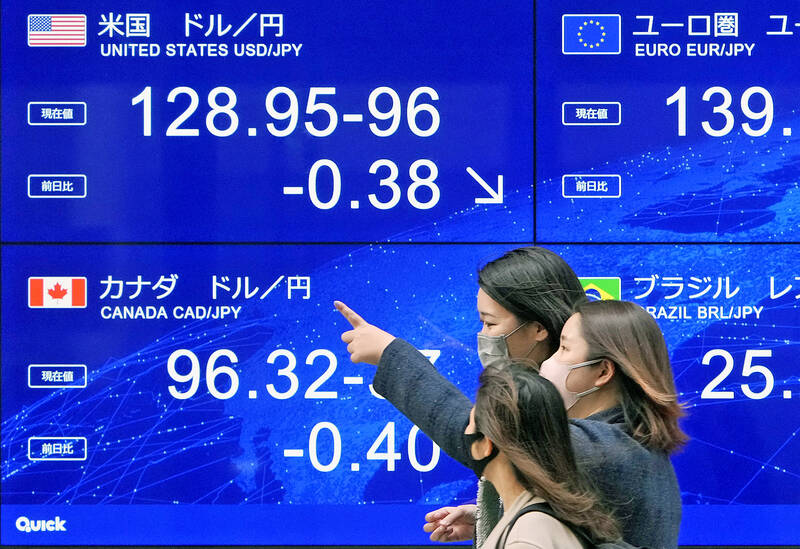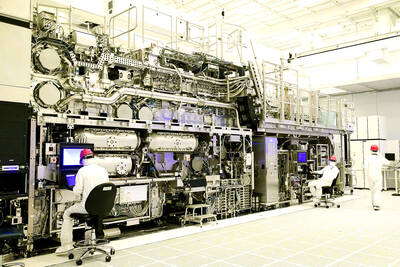The yen on Friday surged on speculation that the Bank of Japan (BOJ) would revise its ultra-loose monetary policy, while the dollar edged up against most other major currencies, rising off of a seven-month low.
The yen rose to ¥129.43 before cooling to ¥127.86, down 1.11 percent from Thursday’s 2.4 percent gain against the dollar.
The moves came after Yomiuri Shimbun reported that BOJ officials would review the side effects of the central bank’s yield curve control (YCC) policy at their meeting this week.

Photo: EPA-EFE
The BOJ is an outlier in clinging to stimulus while most central banks globally are deep into rate-hiking campaigns. Signs of stickier inflation and a possible rise in Japan’s mostly stagnant wages have convinced some investors that YCC could be revised, or even abandoned, as early as next week, opening the door to a stronger yen.
“While a hike next week seems unlikely, it’s possible that the BOJ abandons YCC then in order to set up liftoff at the March or April meetings,” said Win Thin, head of global head of currency strategy at Brown Brothers Harriman. “This is the basic roadmap for tightening that’s been well-established by the Fed.”
The yield on Japan’s benchmark 10-year government bonds breached the central bank’s new ceiling on Friday, adding to pressure for the yield control policy to be scrapped or revised.
The central bank on Friday said it would conduct additional outright bond purchases tomorrow, ahead of its rate setting meeting on Tuesday and Wednesday.
“Our estimated impact of further BOJ policy adjustment points to potential JPY appreciation of up to 2.7 percent, but we believe the risk is for a larger reaction — potentially double in size,” Barclays foreign exchange analysts said in a note to clients.
Elsewhere, better-than-expected economic data out of Germany and Britain suggested both countries could escape a recession — at least for now — but the news failed to provide a lasting boost to either the euro or sterling.
The euro was down 0.19 percent against the dollar at US$1.0828, easing off a fresh nine-month high earlier in the session. Sterling rose 0.18 percent to US$1.2234.
The New Taiwan dollar on Friday rose NT$0.071 to close at NT$30.387, up 1.01 percent from NT$30.695 a week earlier.
The dollar index, which measures the greenback against a basket of currencies, including the euro and yen, edged up 0.02 percent to 102.22.
Additional reporting by staff writer and CNA

ASML Holding NV’s new advanced chip machines have a daunting price tag, said Taiwan Semiconductor Manufacturing Co (TSMC, 台積電), one of the Dutch company’s biggest clients. “The cost is very high,” TSMC senior vice president Kevin Zhang (張曉強) said at a technology symposium in Amsterdam on Tuesday, referring to ASML’s latest system known as high-NA extreme ultraviolet (EUV). “I like the high-NA EUV’s capability, but I don’t like the sticker price,” Zhang said. ASML’s new chip machine can imprint semiconductors with lines that are just 8 nanometers thick — 1.7 times smaller than the previous generation. The machines cost 350 million euros (US$378 million)

EXPLOSION: A driver who was transporting waste material from the site was hit by a blunt object after an uncontrolled pressure release and thrown 6m from the truck Taiwan Semiconductor Manufacturing Co (TSMC, 台積電) said yesterday there was no damage to its facilities after an incident at its Arizona factory construction site where a waste disposal truck driver was transported to hospital. Firefighters responded to an explosion on Wednesday afternoon at the TSMC plant in Phoenix, the Arizona Republic reported, citing the local fire department. Cesar Anguiano-Guitron, 41, was transporting waste material from the project site and stopped to inspect the tank when he was made aware of a potential problem, a police report seen by Bloomberg News showed. Following an “uncontrolled pressure release,” he was hit by a blunt

Quanta Computer Inc (廣達), which makes servers and laptop computers on a contract basis, yesterday said it expects artificial intelligence (AI) devices to bring explosive growth to Taiwan’s electronics industry, as AI applications are starting to run on edge devices such as AI PCs. Taiwanese electronics manufacturers such as chipmakers, component suppliers and hardware assemblers are likely to benefit from a rapid uptake of AI applications, Mike Yang (楊麒令), president of Quanta Cloud Technology Inc (雲達科技), a server manufacturing arm of Quanta, told reporters on the sidelines of a technology forum in Taipei yesterday. “I believe the growth potential is promising once

‘WORST OVER’: A large portion of Hon Hai’s non-operating loss came from Sharp’s large flat-screen business, but Young Liu said the situation is expected to improve Hon Hai Precision Industry Co (鴻海精密), a major iPhone assembler, yesterday reported annual growth of 72 percent in net profit last quarter, due to a dramatic decrease in losses from Sharp Corp’s display business. Net profit surged to NT$22 billion (US$678.7 million) last quarter, from NT$12.83 billion a year earlier, as Hon Hai booked a non-operating loss of NT$4.24 billion, an improvement from NT$20.12 billion in the first quarter of last year. A major portion of its non-operating loss came from Sharp’s large flat-screen business Sakai Display Products Corp. On a quarterly basis, Hon Hai’s net profit sank 59 percent from NT$53.15